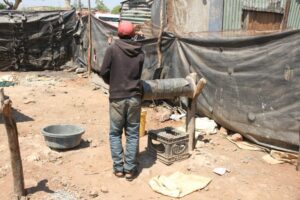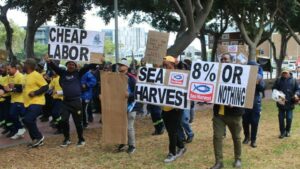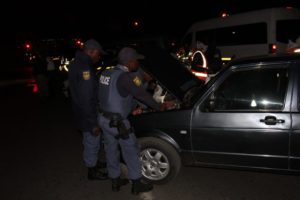Informal settlement residents in the City of Cape Town, Winelands and Overberg district municipalities continue to bear the brunt of the inclement weather that has engulfed the Western Cape for over a week. Gale force winds and torrential rains have been the order of the day since last week Thursday and led to flooding and roofs being blown off, leaving thousands of informal settlement residents destitute and homeless.
Ali Sablay from Gift of the Givers told Elitsha that they got distress calls from 80% of informal settlement residents last night. The organisation is helping more than 23,000 people with food and other humanitarian needs. “Their homes are saturated with water, they lost their bedding, food has been contaminated. So, there has been a huge disaster,” Sablay said.
The South African Weather Services has issued a level 8 warning for the Western Cape which means more bad weather is forecast.
Desperate cries for help
Mammokolo Kubayi, Minister of Human Settlements, visited Ndlovini in Khayelitsha today “to assess progress of interventions for families affected by gale-force winds and heavy rains”. Nombulelo Bonani cried inconsolably and said she ‘’lost everything’’ when her shack in Ndlovini got flooded. Kubayi tried to console her: “We will remove you before the day is out. We know this happens yearly and your belongings get damaged.’’
The department made a decision to be responsible for emergency interventions because the City of Cape Town takes long to help victims of disasters, the minister said. “When we have disasters, we have an intervention mechanism. What delayed here was a beneficiary list. I convened a meeting yesterday because I was battling to get a beneficiary list from the city.”
The residents whose houses were blown away would get building materials on Saturday, she said and 500 flood victims would be moved elsewhere today. The department would organise funds to get land and move shack dwellers from flood-prone areas to dry areas, she said.
Bonani pleads for help from the Minister of Human Settlement. Photo by Vincent Lali
Bulelwa Majola, who stays with four kids, also cried and told Kubayi that she lost her shack to strong winds recently. “I and my kids are sick. When you are sick you must at least have a roof over your head,” she said. “The strong wind blew my shack away along with my belongings. We don’t even have clothes to wear.”
Zukiswa Ngqeshemba whose RDP house in Kuyasa was badly affected by a tornado, said she and her family live in fear as they do not know when the roof will eventually fly off or the walls crumble. “The government officials who are outside only asked if I’d been contacted. I hope that they get me help,” she said.
Nozamva Booi from the YA section of Site B told Elitsha she noticed that her house was getting flooded and the water was not coming through the roof. Booi said she tried to mop out the water but it continued for 3 days. “My entire furniture was drenched in water and for days I have been trying to sweep out the water but it does not stop. I’m helpless now, I am unemployed and we live on my grandchild’s grant,” she said. Some sections of the informal settlement are built on top of stormwater pipes.
The gale force winds and the torrential rains have left a trail of destruction in most informal settlements in the Western Cape. Photo by Mzi Velapi
Long term and permanent solution not in sight
City of Cape Town mayor, Geordin Hill-Lewis, who also visited the victims, said the city is arranging transport to move them to areas where they would stay.
Majola told the mayor that she lost everything as a result of the floods. Photo by Mzi Velapi
“The permanent solution is to move people out of low-lying areas to formal housing but until you do enormous housing developments and find appropriate land for that [it remains] a long-term plan. You also need to put the message out in the community not to build in wetland areas,” said Hill-Lewis.
‘Land expropriastion would
just destroy the value
of land in our cities’
Geordin Hill-Lewis
Pressed to respond on whether disaster conditions could authorise the expropriation of land that could be used for housing, Hill-Lewis said the expropriation of the land is not the answer. “That would just destroy the value of land in our cities and much worse because people would not invest and develop take care of the land. The fact is that there is a certain amount of land that is available. To expropriate land would kill investor confidence in our country,” he said.
Category C informal settlement
residents will be relocated
to land that is safe for
development
Minister Kubayi
Kubayi told Elitsha that the Department of Human Settlement is empowered to expropriate land with or without compensation but they need to prove that there isn’t any other land that is owned by government that could be used for the same purpose. She said that they are embarking on relocation of category C informal settlements to areas that are appropriate for long-term upgrading and formalisation. Eight hundred informal settlements nationally are on sites that are not appropriate for long-term upgrading. “One of the priorities in the next two weeks is to find appropriate land in the city to relocate them. We have done that in Gqeberha where we found safe land for the people, and in Buffalo City we are doing the same. We will be doing that across the country,” she said.
Kubayi said that they will continue with upgrading of informal settlements and ensure that they are provided with bulk infrastructure like stormwater drainage to ensure that they do not get flooded when it rains.





